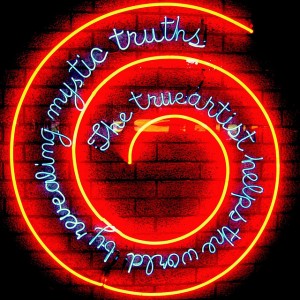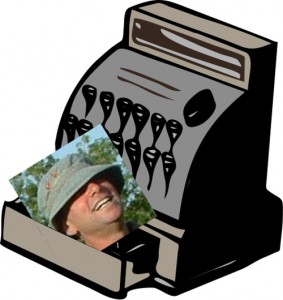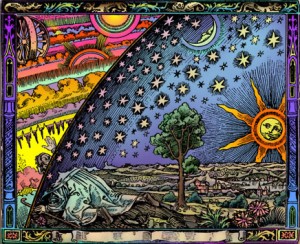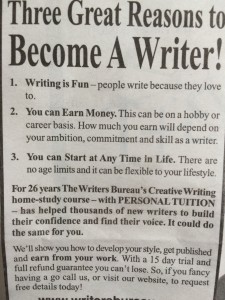Posts by John Vorhaus
I’m in the outline/development stage of writing my next novel, a mystery/thriller called Stella Blue, and as I do with every major new writing project I take on, I have lately asked myself, “What do I want to learn this time?” It has become clear to me that my writing gets better, faster and is more fun (well, scary fun) when I’m out on the face of the wave between what I know and don’t know about my craft.
This time out, I have a couple of goals in mind. One is to do a much better job of outlining and mapping the story before I start writing a draft in earnest. As some of you know, I’m a proudly self-defined “pantser” – I write by the seat of my pants. I’ve always claimed that this was because if I knew in advance where the story was headed, I couldn’t be bothered to write it. These days, I don’t think that’s true. If I’m being honest with myself (as I learned to be from writing my last book, how to live life) I’d have to say that part of me rejects outlining because I perceive it as dry, dull work – heavy lifting at a time when I want light skipping and jumping. But my growth as a writer demands that I part with the pantser model, at least temporarily, if for no other reason than to overcome a certain prejudice and find out, really, if outlining has anything to offer me at all.
The other goal, related to the first, is to see if I can come up with some brand new ways to think about story development. I understand outlining to be the part of the process where I gather raw material for the story. I want to do a better – and therefore must do a different – job of this than I have in the past.
Why do I need new methods for story development? Because I hate story development. In the early days of finding a story it seems like I’m mostly just staring off into space thinking of nothing at all. Sometimes this feeling gets so bad, so frustrating, that the story never develops at all. I don’t lament this – I never force a story to come – I just call it another dry well and move on to the next.
This time around, though, I’m making great progress and having great fun by using a simple new technique I call “story porn.” Basically, all I do is look at pictures that I think might be relevant to my story, and then wait to get excited by what I see.
Read Morephoto by David Chu
I have a truth to share with you – not because I want to, necessarily, but because I think it’ll feel good to get it off my chest. As it’s a deep truth, it’s going to take some getting to. It starts on the surface, like an itching on my skin: I’m afraid I’m running out of truth. I presently fear that I have nothing new to say to you or anyone, about writing, or the writing process, or life, its meaning, or the isness of it all.
Well, that can’t be. It just can’t be. The truth goes on forever. Meaning goes on forever. I know this; every writer knows this. It’s not a matter of depth awareness. I know what deep is – I just don’t feel so good about going there. But I promised myself I would tell you the truth – the true, true truth – and I will. Here it comes.
I’m afraid to admit that my brand isn’t working.
I mean, it’s there and all, and I can leverage in a modest way, but right now it feels so minor league, and in this moment that feels like failure to me.
There, I said it. And now I feel better.
But not much better.
Because if my brand is minor league, then it seems like my ambition outstrips my capacity – and my awareness of this makes my feelings go, “Ouch!” For the record, I’m hosting no pity party here; my feelings can handle an “ouch.” But the truth is, I won’t be as big as I want to, not in this world and not in this life.
At last. (Big sigh.) Finally got to the truth.
Except not.
Because, you know, now I have to ask why. Why did I walk down this self-sell road and build this self-sell platform in the first place? Why am I a cottage industry and not a conglomerate? Is it that I don’t conglomerate well, that I have no interest in building a brand if it means having to build a business as well?
Sure, yeah, that’s part of it.
But it’s not the real truth. The real truth lies deeper still.
John, JV, Johnny… are you selling yourself short? Is your cottage-industry model really just designed to keep you from submitting yourself, your words, your plan, your vision, to someone who can legitimately stand in creative judgement over you in a particular way: someone who will give you big money for it?
That was a big, wild sentence, folks. I can’t justify it, but I’ll try to explain it. It’s a bit of “I want to reject them before they reject me.” Yes, I stand by my aesthetic and yes, I stand by my choices and yes, I’m happy working in my cottage, though I struggle with the industry part. But let’s be honest. I don’t send proposals. I don’t meet editors. I don’t deal with publishers or producers. I know that I don’t want to and I choose not to, and I know that’s partly because I’m afraid they’ll say no. I’d rather not ask than have them say no.
There! That’s it! I’d rather not ask than have them say no. Yay! I finally got to […]
Read MoreEver since last month, when WriterUnboxed introduced the tinyCoffee widget to this website and created the opportunity for readers and writers to get together over a cup of virtual joe (readers’ treat) my head has been spinning – in some senses exploding – with the possibilities that this innovation presents. Not to put too fine a point on it, the revolution has arrived – and the middleman is dead! Thanks to tinyCoffee and its ilk, writers from Tarzana to Tanzania can now form an easy, fruitful, direct – and monetized! – relationship with their readers. Listen carefully… that Cheyne-Stokes respiration you hear? It could be conventional publishing breathing its last.
Read MoreBecause the universe loves me, I found myself in Paris recently with nothing to do but sight-see and visit great museums. I made my way to the Pompidou, which had a mind-boggling retrospective on the works of Jeff Koons, whose iconic Balloon Dog you see here. Upon investigating Koons’ life and work, I discovered that some of his earliest attempts at visual representation were nothing more than finding magazine ads that piqued his interest, framing them, and calling them art. Clearly he had artistic ambition, and also artistic vision, but his ability to exercise his vision? Not so much. So we can say that at that point in his career, the artist’s “eye” had developed further than his “hand.” But why are we talking of Jeff Koons? He’s an artist, right? And this is WriterUnboxed, not ArtistUnboxed, no? So let’s examine this notion of eye and hand from a writer’s point of view.
For the sake of this discussion, we’ll say that our writer’s eye is our understanding of what we want to express, and that our hand is our ability to capture and convey those ideas. The advancement of these attributes, the development of both the writer’s storytelling interests and the effective exploration of those interests, is the basic arc of a writer’s career. We go from not knowing anything and not knowing how to express it to knowing much and having many strategies and tools for expression. That’s the growth of a writer. That’s something we can chart.
So now what I’d like you to do is make two lists.
Read MoreHey gang, with this column I’m going to try to get underneath writing and into something deeper. I’m not sure if it’s appropriate grist for the WriterUnboxed mill but, “Throw it out the window and see if it lands,” right? Your feedback will tell me if I’m on-topic or off-. -jv
Writer’s block, I have discovered, takes place at the intersection of too much fear and not enough information. Whenever I find myself in that dark neighborhood, I never try to write. Instead, I go gather new information. Once I’ve tipped the balance back in information’s favor, I find that my fear goes to sleep and I can go back to work. That’s how I beat writer’s block, not by trying to muscle through it, but by using strategies to make it go away.
I use this same approach to address other issues in my life, be they personal, spiritual, practical, existential, whatever-al. I don’t try to solve my problems, per se. I just study them more deeply – add new information. This gives me practice at gathering and using information – never a bad thing – and, of course, it brings new information to bear on the matter or matters at hand.
Get used to gathering data. Make it part of your practice, part of becoming more you. It’s not important what you look into, just that you have the habit of looking, a habit you can cultivate and enjoy as a positive addiction and a path to enlightenment for as long as you live.
When I tell you that gathering information is a path to enlightenment, I’m not horsing around.
Read MoreSo I was in London, riding on the Underground, when my curiosity required that I pick up a free newspaper on offer. In it I found the ad you see to the left. And it just cracked me up. They make writing sound so easy! All you have to do is start any time, have fun and make money. Gosh, I wonder why everyone doesn’t do it!
Anyway, the ad put me in mind of something called “the Whimsy Manifesto,” which I laid out a few years ago in a little book called How To Write Good. As it resonates of the questions that you and I face every day – why and how to be a writer – I thought I’d share it with you here.
As I grow as a writer, I think more and more that whimsy is one of the strongest cards I can play. I’m not talking about funny writing, but rather a writer’s playfulness – her willingness to make choices. Like my choice just here to make she the default pronoun for this book. Choice is made. I don’t second guess. I move on. As a writing strategy, it’s a pretty darn useful one, so let’s put it on a line by itself.
Choice is made. Don’t second guess. Move on.
I had an idea to write a book called How to Write Good. I thought that the title might be sexy and alluring to a certain type of writer, one already predisposed to appreciate whimsy. I thought I could show how to use whimsy as a tool to write better.
But let’s be careful about the word “better.” Let’s be sure we know what we mean by that. To me, in this context, better is largely just faster. I consider myself a “better” writer when my process is more efficient, when I’m getting more writing done. I don’t consider myself a “better” writer when I’m sitting there staring at the blank page. That’s when I consider myself a worse writer, or worse, no writer. That’s always the point I want to get past. And whimsy is a tool I use there. Why? Because whimsy suspends value judgments. Whimsy says that any choice is a good choice. Whimsy explores ideas just for fun. Whimsy doesn’t care about broken bits of writing or storytelling. Or grammar. Or syntax. Or complete sentences. Whimsy plans to fix everything later. Whimsy, out of sheer whimsy, thinks of as many ways as it can to express whimsy. Whimsy knows there’s more than one path through story. Whimsy knows the secret of how to write good.
Here it is.
Read MoreMy hard drive is kind of a treasure chest. I have so many half-developed ideas and stillborn stories (and such a bad memory for them) that every time I poke around in there I find something unexpected, surprising, and fun. That most of this has seen no commercial light of day is a natural function of a long and productive writing life, and a realistic consequence of the good ol’ wheat-to-chaff ratio. Young writers, I think, cling to the fantasy that every word they write is gold – sellable gold – and that none of it will go to waste. Young friends, I tell you from my heart, most of it goes to waste (see above: wheat-to-chaff ratio). That’s not a good thing and it’s not a bad thing, it’s just a thing that is. Writing is messy and writing is inefficient. That’s why writing is rewriting, and why every level of development is merely the platform upon which we stand to reach the next level.
I never had the expectation that I would exploit every word I wrote, except in the sense that every word I write – wheat and chaff alike – helps me raise my game. But when you have a hard drive as hoary as mine, some of it is bound to find a second life some time, as for example the list you will find below of words and phrases that define certain conditions of the writing life.
Read MoreLast month I went to the Sundance Film Festival for the first time ever because, against all odds, I had a film premiering there. The film is a documentary called Misery Loves Comedy, and it basically asks the question, “Do you have to be effed up to do stand-up, or does doing stand-up eff you up?” (Spoiler alert: yes.) I’ll talk in a moment about what it means to “write” a documentary, but first I’d like to tell you how I got the gig to begin with, and why I took it, because it speaks to one of my core values as a writer: flexibility.
Years ago, as some of you know, I wrote a book on writing comedy called The Comic Toolbox. Fewer years ago, as fewer of you know, I became something of an expert in the field of poker (well, “expert” – I wrote many books on the subject). At some point in the dim and distant past, I played poker with a guy who, as it happened, was a fan of The Comic Toolbox, and we stayed in vague touch for many, many years. Eventually he went into the business of producing documentaries, and since my ideas resonated with him, he asked me if I’d like to be part of Misery Loves Comedy.
So, first lesson: You never know what’s going to wash up on your beach. A book I wrote to clarify my own understanding of comedy, plus many books I wrote to exploit a hot market (poker) created the unforeseen opportunity to do something I’d never done before, write a documentary.
What does it mean to write a documentary? In my case, it meant writing a bunch of framing documents that moved the concept from amorphous goo into something more structured, and writing a lot of questions for the director to ask many comedians. When I said yes to the gig, though, I didn’t know the first thing about writing a documentary. I’d never done it before, didn’t know if I could do it, but that didn’t stop me, or even slow me down, because, second lesson: Never leave money lying on the table. If someone wanted me to pay me to write a documentary, I was by gum going to write a documentary, whether I knew how to do it or not.
Did I have to fake it? Somewhat, but it really wasn’t a problem. I’m long practiced at the art of representing myself as an expert at anything. Frankly, it wouldn’t occur to me not to. If I am committed to learning and growing as a writer (and I am) then I must necessarily accept every challenge that comes my way – especially ones that pay – even if they scare me. [pullquote] If I am committed to learning and growing as a writer (and I am) then I must necessarily accept every challenge that comes my way.[/pullquote] So, third lesson: Do it, even if you’re scared. Do it even if you’ve never done it before and even if you’re not sure you can do it. Don’t let fear of failure ever stop you from trying.
I’m looking over my own shoulder as I write these words and I’m thinking, “That’s easy for you to […]
Read MoreThis month’s column was inspired by an email exchange between myself and fellow WUer Deb Lacativa, who has recently discovered my work and, it humbly pleases me to say, has become a fan. It’s the reason she’s become a fan that I’d like to focus on here. In a nutshell it’s because we’re so much alike. We’re nearly the same age and shared a ton of common experiences “back in the day” (back, that is, before they had the phrase “back in the day.”) We both understand that we came of age in the golden era between the advent of the Pill and the onset of AIDS; we know what a difference that made.
Here was Deb’s provocative question when she’d finished reading my novel of the 1960s, Lucy in the Sky:
“How does this fucking Zeitgeist thing actually work? Are our experiences so awfully common? How could we both have characters named Jude and Ray? I know! “Hey Jude” and “You can call me Ray,” that’s how. Shit just gets into the gray matter grooves. How did my mother’s friggin’ Chevelle come into play [in your story]? The list goes on, but you’d be bored unless you’d heard me squeal like a stricken goat each time I came across another parity. Were all our experiences that one year so compressed, focused? Did we all get the acid, one way or another? I’m beginning to believe it’s true.”
Deb, I’m beginning to believe it, too. We drank (smoked, snorted, swallowed) from the well of common experience, and as a consequence, our innocent little 1950s-born selves were torn down and rebuilt from scratch in the ‘60s and ‘70s. When people come from the same place and the same time, they shouldn’t be surprised to find that they think the same way.
What I am surprised about is how I have for so long overlooked this obvious reality, and its impact on my reach as an author.
Read More(GIVEAWAY – GIVEAWAY- GIVEAWAY! In honor of the release of POOLE’S PARADISE, my generous benefactors at Bafflegab Books are awarding free e-copies of the novel (specify .pdf or .prc) to the first five people who correctly answer the following question: What do the words FACETIOUSLY and ABSTEMIOUSLY have in common? (Hint: the word MYUOPILEA has exactly the opposite quality.) Email your answer to john.vorhaus – at – gmail.com. HURRY! I mean HURRAH!)
So, yeah, my new novel comes out this week, POOLE’S PARADISE: An Imperfect Search for Purpose, and as you can probably guess from the subtitle, it has something to do with “purpose” – what that is, why it’s important, how it’s defined, and how we go about finding it. Our hero’s just a college kid, and can thus be forgiven, due to a case of extreme youth, for not having his sense of purpose dialed in. We, though, you and I, we are experienced writers, and it’s worth thinking about what our purpose is, and how to go about aligning our actions with our goals.
For a long time, I thought that my purpose was pretty simple: Sell More Books. Upon close inspection, however, I realize that that’s not purpose at all. It’s just a means to an end: the opportunity, freedom and financial security to… well, to do what? What is the end that my means so assiduously seek to serve?
There are all kinds of purposes that writing a book can serve.
Read MoreThere is no excerpt because this is a protected post.
Read MoreFor those of you attending the Writer Unboxed Un-Con – especially the newbies among us – it may be useful to give some thought to how to get the most out of your upcoming writers conference experience. For those of you not attending UnCon, it may be useful to store these tips in a cool, dry place, against the day when you next wander down the conference trail. And for those of you with long experience of writers conferences, it might be useful to ignore everything that follows – but chip in with your own tips at the end.
First and foremost, campers, SET THE RIGHT GOAL. If you head into UnCon (or any con) with the goal of hitting some prized target (like landing an agent or a book deal, or whatever your ticket to heaven might be), you risk disappointment if that doesn’t happen. Worse, you’ll put all this stress on yourself to make it happen. Instead try this: Have fun. That’s a goal you can easily achieve, just by showing up and hanging out. I’m not saying don’t make the most of your networking opportunities. I’m just saying don’t obsess about it. As they say in poker (whence, let’s face it, all wisdom springs), “Let the game come to you.” What this is really about is setting your expectations. High expectations = buzz kill. Low expectations = fun!
Next order of business, SITUATE YOUR EGO. Take a few minutes to think about yourself, your sense of self, and where your insecurities lie. Then take all that self-consciousness, box it up, wrap it neatly with a bow – and leave it at home. A con is supposed to be a place to relax, meet friends, make friends, learn shit, renew your passion, and soak up energy like a sponge. It’s not a place to fret about whether you’re shining in others’ eyes. That’ll just make you try too hard. News flash: you don’t have to be momentous; you just have to be you. And if you’re really worried that people are judging you in some sense or any sense, remember this sardonic observation that Dr. Phil takes credit for, but really it’s from Eleanor Roosevelt, “You wouldn’t worry so much about what others think of you if you realized how seldom they do.”
[pullquote]It usually works to buy drinks.[/pullquote]
With that in mind, MEET EVERYONE (which you now can easily do, since you’ve A) lowered your expectations and 2) left your ego at home). If you have trouble breaking the ice, here’s time-tested wisdom handed down from Ascended Stairmasters of yore: “It usually works to buy drinks.” Alternatively, reference this column. Just say to anyone you meet, “You know, that wannabe Stairmaster John Vorhaus recommends meeting everyone I can at these things, so this is me meeting you now.” (Especially use that line if you and I meet; we will find it hilarious.) And here’s an inner-game tip for you whose memory is as bad as mine. If you collect a lot of business cards and then can’t remember who gave them to you, just have them hold it and take their picture. It’s a little mug-shotty, but a reliable way to put names to […]
Read MoreSo I’m a pantser – a seat-of-the-pants writer who makes up the plot as he goes along. I figure if I already know the end of the story, there goes the joy of discovering it and, really, for me, much the point of writing it. Some among you are like me in that respect. Others among you are like me in this other respect: I hate outlining like a cat hates baths. The thought of sitting down and actually plotting things out…yeesh. In a very real and tangible sense, I would rather bathe a cat.
So here’s the consequence of that. I write these incredibly fast, very ragged, awfully ugly first drafts. I put a lot of ideas into play that I know will probably not pan out. I let loose ends live. I basically write anything I can think of, whether I can neatly tie it into the story or not. Unraveling the story problems, according to this model, can always come later.
Trouble is: Later always comes.
So there I am, stuck with a fast, ragged, ugly first draft, with loose ends sticking out all over, no clear sense of what I’m driving at thematically and – you can be sure of this – an ending that 100 percent does not work. My endings never work on the first draft because I simply don’t have enough information yet to write them well. So I write them very badly, then review what I’ve written and inevitably say this: “Okay, well, now I know what not to write.”
Read MoreLast time we talked about the writing process from a tyro’s point of view. Let’s continue with that train of thought, and see if we can continue to build a coherent (and at least cautiously optimistic) view of the writer’s life.
Writing has been described as a battlefield, and the metaphor may be apt, but this battlefield is fluid; you never know where you’re going to make your breakthroughs. In fact, given that creativity often involves taking yourself by surprise, you can expect to make breakthroughs in unexpected places. Especially if you’re expecting them.
Expecting the unexpected? Is that what being a writer is about?
In a sense. There is a phenomenon that’s common to writers, the feeling or sensation that washes over us when we see our writing take on a life of its own. You bury yourself in a writing project for an hour or a day or a week or a month or a year, and later you look back and wonder where did all that come from? That’s the magic of writing: I know that I wrote all the words, but they don’t all seem to have been written by me.
There’s either a logical or a mystical explanation for this. Logic tells us that if we work on a project long enough with our conscious mind, eventually our subconscious mind starts to pitch in too. Mystics tell us that creativity is bestowed upon us by higher powers, and by writing we put ourselves into a place where higher powers can act upon us. Which explanation is right? Doesn’t matter. Choose either one you like.
They serve the same end. If you take the logical approach, you’re going to spend more time writing in order to derive more benefit from your subconscious partner. If you take the mystical approach, then you’ll spend more time writing as a means of positioning yourself to receive the gifts that higher powers bestow.
Either way you win, because either way you’re going to spend more time writing. But there’s a catch: To be a well-informed and confident writer, you have to write a lot, yet to write a lot, you have to be a well-informed and confident writer. How do we resolve this paradox? How can we work toward being the kind of writers we want to be in advance of having the necessary craft and craftsmanship to move forward. How do we build strength?
Read More












